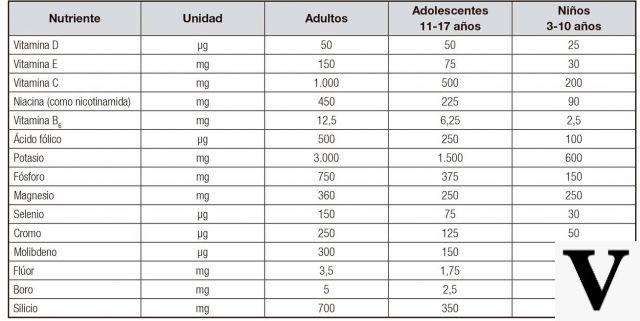
Introduction
Vitamins and minerals are micronutrients of fundamental importance that, in addition to being synthesized in part by the organism itself, they are introduced with the diet.
In some cases, however, it may be necessary to resort to the use of food supplements that contain them to cope with a possible increased need or insufficient intake.
Although these are essential nutrients for life, the intake doses are very important. In fact, a excess of vitamins and minerals He can have negative effects on health as a deficiency. For this reason, in food supplements these nutrients must be present in concentrations such as to never exceed the maximum values imposed by the legislation currently in force on the subject.
Definition of Maximum Doses
Who determines what are the Maximum Allowable Doses of Vitamins and Minerals in Food Supplements?
The maximum permissible doses of vitamins and minerals within food supplements are established by the Ministry of Health and regulated by the legislation currently in force on the matter. The Ministry draws up its own provisions on the basis of Nutrient Reference Values (VNR) or NRVs (from English Nutrient Reference Values). The NRV indicates the amount of vitamins and minerals that a person should take to meet the minimum daily requirement of these nutrients, as reported in Annex XIII, part A, point 1 of Regulation (EU) 1169/2011.
The general indications of the Ministry of Health regarding the content of the nutrients in question in dietary supplements and their expression on the label of these products are as follows:
- The minimum intake of vitamins and minerals with the amount of daily intake indicated on the label it must not be less than 15% of the reference nutritional values (VNR) - or "Nutrient Reference Values" (NRVs) - listed in Annex XIII, part A, point 1 of Regulation (EU) 1169/2011.
- On the label, the weight content of vitamins and minerals on the amount of daily intake must also be expressed as percentage of the NRV where applicable.
Admissible doses
Vitamins and Minerals in Supplements: What are the Maximum Allowable Doses?
The table below shows the daily intake of vitamins and minerals allowed in food supplements. The values shown refer to the April 2019 revision carried out by the Directorate General for Hygiene and Food Safety and Nutrition of the Ministry of Health.
| Micronutrients | Maximum admitted daily intake |
| Vitamin A - (total Retinol Equivalents) | 1200 mcg (micrograms) |
| Vitamin A - Beta carotene as the only source | 7,5 mg (1250 mcg RE) |
| Vitamin D | 50 mcg |
| Vitamin E | 60 mg |
| Vitamin K | 200 mcg |
| Vitamin C: | 1000 mg |
| Thiamine (vitamin B1) | 25 mg |
| Riboflavin (vitamin B2) | 25 mg |
| Niacin (vitamin B3) | 54 mg |
| Vitamin B6 | 10 mg |
| Folic acid (vitamin B9) | 400 mcg |
| Vitamin B12 | 1000 mcg |
| Biotin (vitamin B8) | 450 mcg |
| Pantothenic acid (vitamin B5) | 18 mg |
| Soccer | 1200 mg |
| Phosphorus and Potassium | 1200 mg |
| Magnesium | 450 mg |
| Iron | 30 mg |
| Zinc |
15 mg for products intended for adults 7,5 mg for products intended for children (from 3 years) and adolescents |
| Copper | 2 mg |
| Manganese | 10 mg |
| Fluorine | 4 mg |
| Selenium | 100 mcg |
| Chrome | 200 mcg |
| Molybdenum | 100 mcg |
| Iodine | 225 mcg |
| Boron | 3,6 mg |
| Potassium | Undefined |
| Chlorine | Undefined |
| Sodium | Undefined |
| Silicon | Undefined |
In addition to the above values, the Ministry of Health provides that:
- With regard to zinc, for products possibly intended for infants (up to 3 years), the NRV of 5 mg (as per directive 2006/141 / EC) cannot be exceeded.
- For fluoride, considering the needs of children within three years of age, a minimum intake of 0,25 mg is allowed even if it is less than 15% of the NRV.
- For boron, for which there is no NRV, the minimum intake must not be less than 0,23 mg.
- With regard to potassium, for contributions with the daily dose equal to or greater than 1000 mg, the warning must be reported on the label:
"For potassium intake, it is advisable to consult a doctor. The concomitant intake of some drugs can in turn interfere with the retention of potassium in the body. The use is not recommended for children."


























